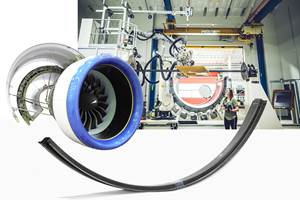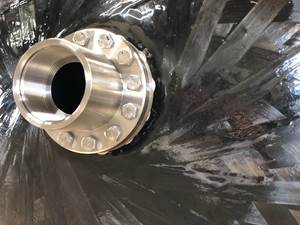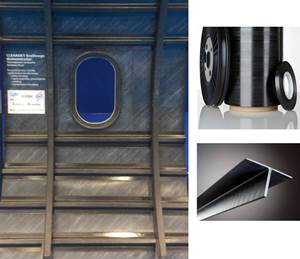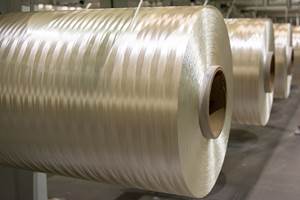CRTC and IACMI to develop advanced carbon recycling equipment
Thanks to a new contract with IACMI, the CRTC will pioneer ways to automate processing of carbon prepreg scrap. This technology breakthrough is essential so recycled carbon fiber can be processed in high volumes, says CRTC.
In 2016, the Composite Recycling Technology Center (CRTC, Port Angeles, WA, US) became the first facility in the world to transform carbon fiber composite pre-preg scrap into new products. Now, thanks to a new contract with a national manufacturing institute, the CRTC will pioneer ways to automate processing of this scrap. This technology breakthrough is essential so recycled carbon fiber can be processed in high volumes, fulfilling its enormous potential for energy savings and carbon reduction and creating a global composites recycling industry.
The one-year contract with the Institute for Advanced Composites Manufacturing Innovation (IACMI, Knoxville, TN, US) will provide over $400,000 for the CRTC’s work to design and build processing equipment designed specifically to prepare uncured aerospace carbon fiber scrap for high volume manufacturing applications. The CRTC plans to begin making products using this process by the end of 2017 and quadruple the throughput of scrap material by the middle of 2018. The novel manufacturing machinery developed under this contract will be instrumental in growing the number and volume of products made at the CRTC. Moreover, the technology developed by the CRTC will be made available to other facilities seeking to recycle composites in high volume, boosting the emergence of this new industry. This contract announcement further cements the CRTC/IACMI partnership announced one year ago at a celebratory MOU signing event featuring leadership from the two partnering organizations, The Department of Energy’s Advanced Manufacturing Office, Washington’s Department of Commerce, the Port of Port Angeles, and local economic development groups.
“The IACMI contract is a landmark achievement,” said the CRTC’s CEO Bob Larsen. “It validates the CRTC’s technology approach from the national level and is a strong vote of confidence in our young company and its business plans. It supports our drive to self-sufficiency and for creating good-paying local jobs and advances the growth of the carbon fiber recycling industry, a core part of the CRTC’s and IACMI’s missions.”
IACMI is one of over ten national Manufacturing Innovation Institutes that accelerate U.S. advanced manufacturing by supporting research and development of new technologies, production processes, and workforce training opportunities via shared contributions from the public and private sectors. IACMI’s focus on advancing composite material technology includes a significant effort in recycling of composite materials – a sizable challenge constraining the growth of the industry.
Washington Senator Maria Cantwell, a longtime champion of CRTC, had this to say about the agreement: “Washington state and the Composite Recycling Technology Center are continuing to lead the way on carbon fiber recycling technology. These are the types of public-private partnerships we should be investing in to grow good paying manufacturing jobs.”
The contract also includes planning support from the CRTC for IACMI’s recycled composites program. The CRTC will be working closely with IACMI’s Materials and Processing researchers from Oak Ridge National Laboratory and the University of Tennessee, Knoxville throughout the contract. The technical targets of this project will provide the building blocks for future programs in higher-throughput advanced recycling equipment development, leading to the use of repurposed carbon composite scrap in vehicles and clean energy production applications within 5 years.
The CRTC, an independent 501(c)(3) non-profit corporation, was launched by the Port of Port Angeles in 2015 as an economic development initiative to respond to the growing need of the composite and aerospace industries to recycle and reuse remnants from their production processes. It is the only company in the world to divert uncured carbon fiber scrap from landfills and transform it into consumer products. The CRTC moved into a new production facility on 18th Street in Port Angeles in August, 2016, and currently employs 17 people. 2018 projections point to more than doubling the number of employees by the end of next year.
The CRTC has a supply and technical support agreement with Toray Composites (America) Inc. (Tacoma, WA, US), and a multi-faceted agreement with ELG Carbon Fibre Ltd. (Coseley, Dudley, UK) for joint recycled carbon fiber supply as well as material and product development.
The CRTC’s campus also houses Peninsula College’s Advanced Manufacturing-Composite Technology program with classrooms, offices, and lab facilities. This program gives students hands-on training in advanced materials recycling and remanufacturing techniques. Co-location with the CRTC provides students with unequaled opportunities for internships, manufacturing and R&D experience, and exposure to production operations. For more information about the CRTC, see www.compositerecycling.org.
Related Content
The potential for thermoplastic composite nacelles
Collins Aerospace draws on global team, decades of experience to demonstrate large, curved AFP and welded structures for the next generation of aircraft.
Read MoreInfinite Composites: Type V tanks for space, hydrogen, automotive and more
After a decade of proving its linerless, weight-saving composite tanks with NASA and more than 30 aerospace companies, this CryoSphere pioneer is scaling for growth in commercial space and sustainable transportation on Earth.
Read MorePEEK vs. PEKK vs. PAEK and continuous compression molding
Suppliers of thermoplastics and carbon fiber chime in regarding PEEK vs. PEKK, and now PAEK, as well as in-situ consolidation — the supply chain for thermoplastic tape composites continues to evolve.
Read MoreBio-based acrylonitrile for carbon fiber manufacture
The quest for a sustainable source of acrylonitrile for carbon fiber manufacture has made the leap from the lab to the market.
Read MoreRead Next
“Structured air” TPS safeguards composite structures
Powered by an 85% air/15% pure polyimide aerogel, Blueshift’s novel material system protects structures during transient thermal events from -200°C to beyond 2400°C for rockets, battery boxes and more.
Read MoreVIDEO: High-volume processing for fiberglass components
Cannon Ergos, a company specializing in high-ton presses and equipment for composites fabrication and plastics processing, displayed automotive and industrial components at CAMX 2024.
Read MorePlant tour: Daher Shap’in TechCenter and composites production plant, Saint-Aignan-de-Grandlieu, France
Co-located R&D and production advance OOA thermosets, thermoplastics, welding, recycling and digital technologies for faster processing and certification of lighter, more sustainable composites.
Read More




















